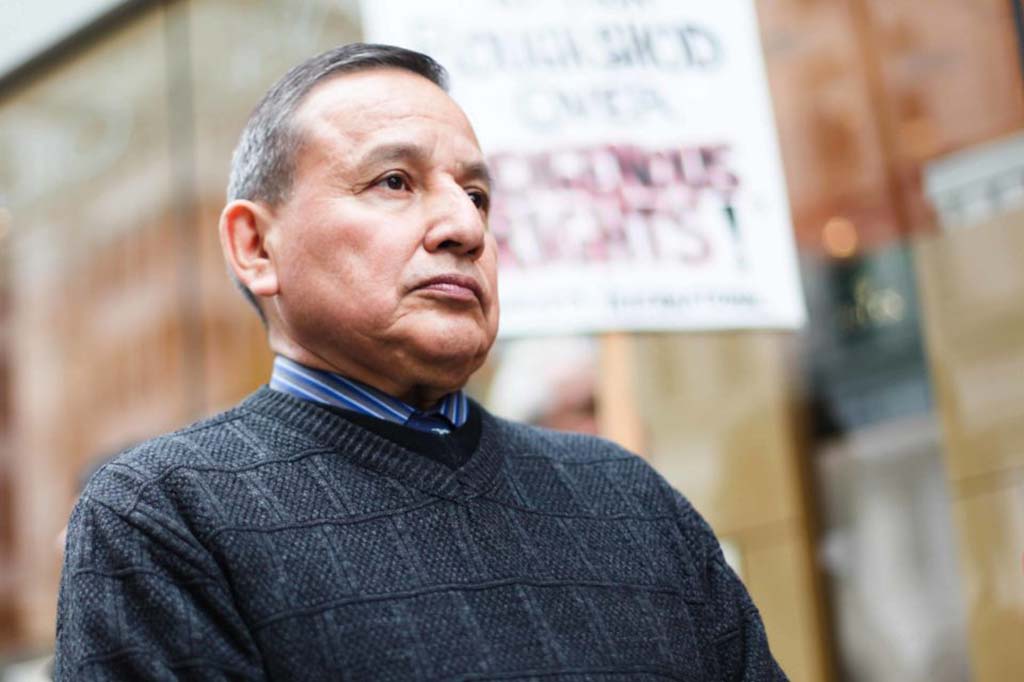A delegation of nearly 200 Métis, Inuit and First Nations people of Canada gathered in Rome, Italy, last week to watch Pope Francis deliver a long-awaited apology for what he called “the deplorable conduct of these members of the Catholic Church” who abused generations of Indigenous children in Canada’s residential schools. “I want to say to you with all my heart, I am very sorry,” the Pope told the delegates in Italian.
Many tuned in to the announcement closer to home. Shortly after the apology broadcasted internationally, the Vancouver office of the Union of British Columbia Indian Chiefs issued a statement calling for tangible commitments to accompany the Pope’s statement.
“This was more than abuses by a few individuals,” said UBCIC president Grand Chief Stewart Phillip. “It was, in its entirety, a massive human rights violation and part of a systemic and institutionalized attempt to destroy our communities that left deep intergenerational emotional damage and harm that continues to date.”
Canada’s residential schools were federally-funded, church-run institutions that operated in every province and territory with the exception of Prince Edward Island, Newfoundland and Labrador, and New Brunswick from the 1880s to 1996. Federal authorities such as the police would forcibly remove children from their homes and house them in the schools, which prohibited them from speaking their language, practicing their culture and traditions, and being with their families.
It’s well known that Indigenous children experienced widespread sexual, physical, emotional and spiritual abuse in the institutions. The inhospitable, often overcrowded living conditions also subjected them to ongoing illness and malnutrition. Upwards of 150,000 Indigenous children were part of the residential school system. At the peak of their operation in 1931, more than half of all residential schools in Canada were administered by the Catholic Church.
“We expect the Pope to accompany today’s apology with commitments to restitution and reparation, including to repatriate lands used for church mission work and to enter into a new relationship based on mutual understanding, self-determination and respect,” Chief Phillip said.
In Rome during his meetings with Indigenous delegates of Canada, the Pope promised he would visit Canada this July.
Lorelei Williams was part of the delegation in Rome. Williams is Salish and Coast Salish from the Skatin and Sts’Ailes Nations. She is the founder of the Vancouver-based dance group Butterflies in Spirit and is an advocate for Missing and Murdered Indigenous Girls and Women. Both her late parents are survivors of the St. Mary’s Indian Residential School in Mission, B.C.
Interviewed by Brandi Morin, a French, Cree and Iroquois journalist reporting from Rome for Al Jazeera, Williams’ reaction to the apology was one of tempered hope. “I’m grateful to see what is coming out of it,” she told Morin. “But I have trust issues with the government, I have trust issues with the churches. I always have hope, but I won’t be shocked if nothing comes out of it [from the church].”
The apology, meanwhile, seemed to spark a flurry of activity among local settlers eager to deepen their understanding of Indigenous issues. So much so that Ta7taliya Michelle Nahanee, a member of the Skwxwu7mesh Nation and founder of the Vancouver consulting group Nahanee Creative, which specializes in educational workshops on decolonizing practices for workplaces and institutions, issued a statement on Saturday.
“This isn’t the week to demand we decolonize and Indigenize your organization in two hours, three Saturdays from now, no matter how many emails or DMs you send,” she wrote in an Instagram post April 2.
“Survivors & inter generational [sic] survivors of attempted cultural genocide are allowed to feel however we are feeling and those reactions and expressions will be mixed.
“Make sure you are respectful of Indigenous Peoples always, silencing us, controlling our behaviours & pitting us against each other are neocolonialism.
“Prayers for peace for survivors & gratitude for our Ancestors and all they carried forward for us.
“I’m waking up from long dreams of powerlessness, feeling a lot of feelings and needing healing and rest.
“Give us some time to respond to emails and don’t expect an automatic yes, we’re not vending machines.”
Colonial violence takes many forms. It takes everyone to turn it around. ![]()
Read more: Indigenous, Rights + Justice

















Tyee Commenting Guidelines
Comments that violate guidelines risk being deleted, and violations may result in a temporary or permanent user ban. Maintain the spirit of good conversation to stay in the discussion.
*Please note The Tyee is not a forum for spreading misinformation about COVID-19, denying its existence or minimizing its risk to public health.
Do:
Do not: